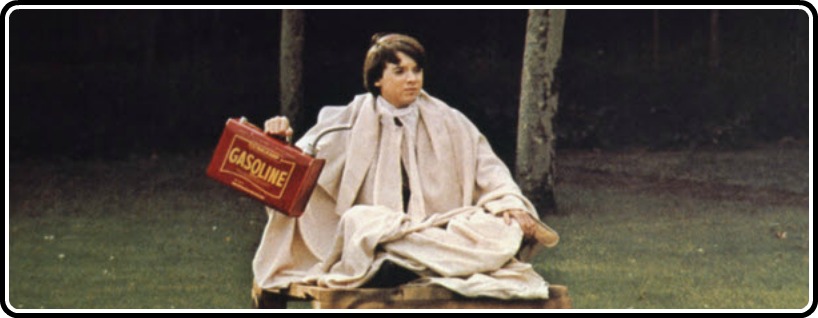Romeo and Juliet. Beauty and Beast. Rick and Ilsa. These are just some of the most iconic, star crossed lovers ever to make their way into popular culture. However, one of the most emotionally rewarding duos happens to be one that rarely ever gets mentioned.
Harold And Maude stars Bud Cort as a young man with a penchant for trying to take his own life. His admiration for death is seen from the very first frame, as we are introduced to this man, Harold, as he is attempting to hang himself. With each attempt failing in the most blackly comedic ways possible, Harold runs into and sparks a relationship with a 79-year-old woman, Maude. Played by Ruth Gordon, Harold falls for the woman, and the film follows their relationship together.
Gordon and Cort are easily the film’s strongest aspects. Cort is particularly good, playing the film’s lead. Harold is a distinctly difficult character to make at all relatable, but his sense of alienation is universal and the film’s most intriguing emotional level. The film hit theaters in 1971, and the alienation found within the film, and the palpable sense of existential doom really makes the film both great, and a distinct time capsule from the post-flower power era.
And then you have Maude. The yellow-umbrella using, defiant elderly love interest for our lead, is equally alienated, but now hitting her 80th birthday, she has come to terms with both her pending death, and also the fact that life is entirely alienating. This is something that Harold deals with roughly eight different times, each time he attempts to take his own life, be it by seppuku or a gunshot to the skull. However, without being able to do anything himself, throughout the film he and Maude discover and discuss the fact that frankly, our lives are run by existential forces that simply leave us awaiting our inevitable demise. One of the most darkly comedic films of its time, it’s also one of the most thought provoking films of American cinema from the 1970s.
Directed by Hal Ashby, this is both his first Criterion-approved release, and also easily the most Criterion-appropriate one. With a great sense of melancholy, the film features breathtaking cinematography, and evocative camera work and framing, making it a deeply moving bit of filmmaking from one of the generation’s most singular names. Very much a ‘˜70s film, the piece is emotionally charged, and also lusciously put together, showing the touches of an auteur with a singular hand at work.
However, any discussion of Harold and Maude would be as fallible as Harold himself if one was unable to discuss the film’s brilliant soundtrack. Featuring two original cuts from Cat Stevens (both ‘˜Don’t Be Shy’ and the iconic ‘˜If You Want To Sing Out, Sing Out’), the soundtrack is entirely tracks from the folk legend, and it may very well be the single greatest source material soundtrack ever found in cinema. Evoking sonically what Ashby does visually and the team of Ruth and Cort do performance wise, the film as a whole is a brilliant blend of substance and style, both of them working equally as hard to make each other all the more effective. Toss in some Tchaikovsky and you’ve got a soundtrack that in the aforementioned trio, may in fact be the biggest player.
As far as a Criterion release goes, this one is admittedly a doozy. Delayed a month, the film has finally arrived this week, and it’s impeccable. The transfer is top notch, with Stevens’ soundtrack sounding as good as it ever has with this release, as the film also hasn’t looked this good in quite some time. A commentary is featured here, that is both massively entertaining (featuring the film’s producer Charles B. Mulvehill and Ashby biographer Nick Dawson) and also really quite enlightening, adding a great sense of rewatchability to a film that frankly, is on its own something of a staple that you’ll be going back to routinely. Ashby and Higgins make their presences known in some illustrated excerpts of respective seminars given by the two, and also there is an interview with Cat Stevens himself. However, the booklet shouldn’t be forgotten, as the artwork from Jordan Crane is stunning ad evocative, and the Matt Zoller Seitz penned essay is fantastic. There is also interviews with Cort, director of photography John Alonzo and executive producer Mildred Lewis, rounding out what may be one of Criterion’s best releases of 2012.




![Bergman Island (The Criterion Collection) [Blu-ray]](https://criterioncast.com/wp-content/uploads/2022/11/bergman-island-the-criterion-collection-blu-ray-400x496.jpg)
![This Is Not a Burial, It’s a Resurrection (The Criterion Collection) [Blu-ray]](https://criterioncast.com/wp-content/uploads/2022/11/this-is-not-a-burial-its-a-resurrection-the-criterion-collection-blu-ray-400x496.jpg)
![Lars von Trier's Europe Trilogy (The Criterion Collection) [The Element of Crime/Epidemic/Europa] [Blu-ray]](https://criterioncast.com/wp-content/uploads/2022/11/lars-von-triers-europe-trilogy-the-criterion-collection-the-element-of-400x496.jpg)
![Imitation of Life (The Criterion Collection) [Blu-ray]](https://criterioncast.com/wp-content/uploads/2022/11/imitation-of-life-the-criterion-collection-blu-ray-400x496.jpg)
![The Adventures of Baron Munchausen (The Criterion Collection) [4K UHD]](https://criterioncast.com/wp-content/uploads/2022/11/the-adventures-of-baron-munchausen-the-criterion-collection-4k-uhd-400x496.jpg)
![Cooley High [Criterion Collection] [Blu-ray] [1975]](https://criterioncast.com/wp-content/uploads/2022/11/cooley-high-criterion-collection-blu-ray-1975-400x496.jpg)